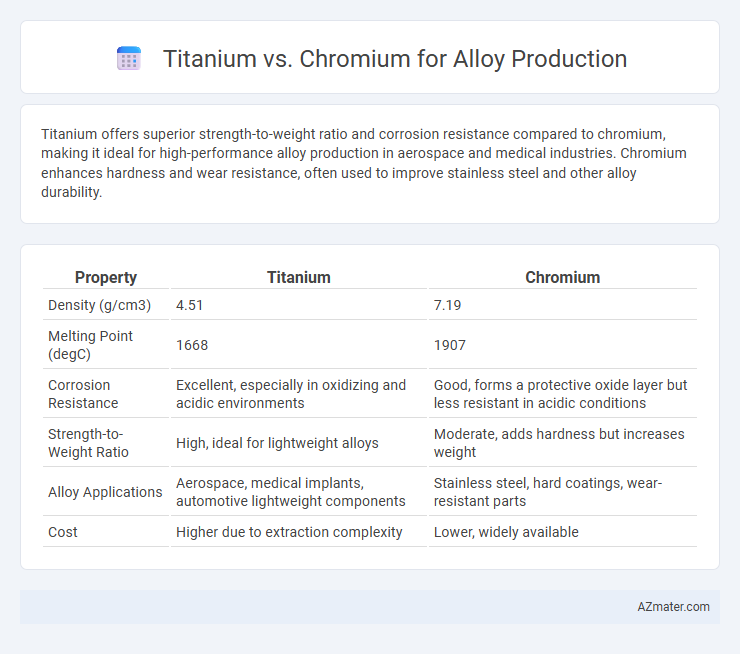Titanium offers superior strength-to-weight ratio and corrosion resistance compared to chromium, making it ideal for high-performance alloy production in aerospace and medical industries. Chromium enhances hardness and wear resistance, often used to improve stainless steel and other alloy durability.
Table of Comparison
| Property | Titanium | Chromium |
|---|---|---|
| Density (g/cm3) | 4.51 | 7.19 |
| Melting Point (degC) | 1668 | 1907 |
| Corrosion Resistance | Excellent, especially in oxidizing and acidic environments | Good, forms a protective oxide layer but less resistant in acidic conditions |
| Strength-to-Weight Ratio | High, ideal for lightweight alloys | Moderate, adds hardness but increases weight |
| Alloy Applications | Aerospace, medical implants, automotive lightweight components | Stainless steel, hard coatings, wear-resistant parts |
| Cost | Higher due to extraction complexity | Lower, widely available |
Introduction to Titanium and Chromium Alloys
Titanium alloys exhibit high strength-to-weight ratios, excellent corrosion resistance, and superior biocompatibility, making them ideal for aerospace, medical, and marine applications. Chromium alloys, known for their exceptional hardness, wear resistance, and oxidation resistance, are extensively used in stainless steel production and surface coatings. Both metals enhance alloy performance by contributing unique mechanical properties and environmental durability.
Key Properties of Titanium in Alloy Production
Titanium exhibits exceptional strength-to-weight ratio and corrosion resistance, making it ideal for aerospace and medical alloy applications. Its high melting point and ability to maintain mechanical properties at elevated temperatures enhance durability and performance in extreme environments. Titanium's biocompatibility and non-toxic nature further distinguish it from chromium alloys, broadening its use in implants and specialized industrial components.
Distinct Characteristics of Chromium in Alloys
Chromium in alloy production is distinguished by its exceptional corrosion resistance and hardness, making it a critical element in stainless steel manufacturing. Its ability to form a stable, passive oxide layer enhances the durability and oxidation resistance of alloys at high temperatures. Chromium's high melting point and wear resistance contribute to alloys with improved strength and longevity in demanding industrial applications.
Alloy Strength and Durability: Titanium vs Chromium
Titanium alloys exhibit superior strength-to-weight ratios and exceptional corrosion resistance, making them ideal for high-performance applications requiring durability and lightweight properties. Chromium, primarily used as an alloying element in steels, significantly enhances hardness, wear resistance, and corrosion protection but generally adds weight compared to titanium. For alloy production focused on strength and durability, titanium provides enhanced mechanical performance in aerospace and medical fields, while chromium's value is pronounced in stainless steel production and surface-hardening treatments.
Corrosion Resistance Comparison
Titanium alloys exhibit superior corrosion resistance compared to chromium-based alloys due to the formation of a stable, protective oxide layer that prevents further oxidation and degradation. While chromium enhances corrosion resistance in stainless steel through its chromium oxide passive film, titanium's oxide layer remains effective in more aggressive environments, including acidic and salty conditions. Consequently, titanium alloys are preferred in applications requiring long-term durability against pitting, crevice corrosion, and stress corrosion cracking.
Industrial Applications of Titanium-Based Alloys
Titanium-based alloys excel in industrial applications due to their exceptional strength-to-weight ratio, corrosion resistance, and biocompatibility, making them ideal for aerospace, medical implants, and chemical processing equipment. Unlike chromium, which is primarily used for enhancing hardness and corrosion resistance in stainless steels, titanium alloys offer superior performance in high-temperature and corrosive environments. The high demand for titanium alloys in aerospace components and medical devices highlights their critical role in industries requiring lightweight, durable, and biocompatible materials.
Common Uses of Chromium-Based Alloys
Chromium-based alloys are extensively used in stainless steel production, providing exceptional corrosion resistance and strength, essential for construction, automotive, and aerospace industries. These alloys excel in high-temperature environments, making them ideal for gas turbines, jet engines, and heat exchangers. The chromium content also enhances hardness and wear resistance, benefiting tools, cutlery, and industrial machinery components.
Cost-Effectiveness and Availability
Titanium offers exceptional strength-to-weight ratio and corrosion resistance, making it highly valuable but comes with higher extraction and processing costs compared to chromium. Chromium is more abundant and cost-effective, widely used as an alloying element to enhance hardness and corrosion resistance in stainless steel and other alloys. For cost-sensitive alloy production, chromium provides more economical scalability, whereas titanium suits applications prioritizing performance despite its premium price.
Environmental and Safety Considerations
Titanium alloys offer superior corrosion resistance and biocompatibility, reducing the need for harmful protective coatings and contributing to safer, more environmentally friendly applications compared to chromium-based alloys. Chromium production and use involve significant environmental hazards, including toxic hexavalent chromium emissions and potential health risks such as respiratory problems and skin ulcerations. Transitioning to titanium alloys in alloy production can minimize ecological impact and enhance workplace safety by lowering exposure to hazardous substances and reducing environmental contamination.
Making the Right Choice: Titanium or Chromium for Alloys
Titanium offers exceptional strength-to-weight ratio and excellent corrosion resistance, making it ideal for aerospace and medical alloy applications. Chromium enhances hardness, wear resistance, and corrosion protection, commonly used in stainless steel and high-performance coatings. Choosing between titanium and chromium depends on whether lightweight durability or surface hardness and oxidative stability is the primary requirement for the alloy's end use.

Infographic: Titanium vs Chromium for Alloy Production
 azmater.com
azmater.com